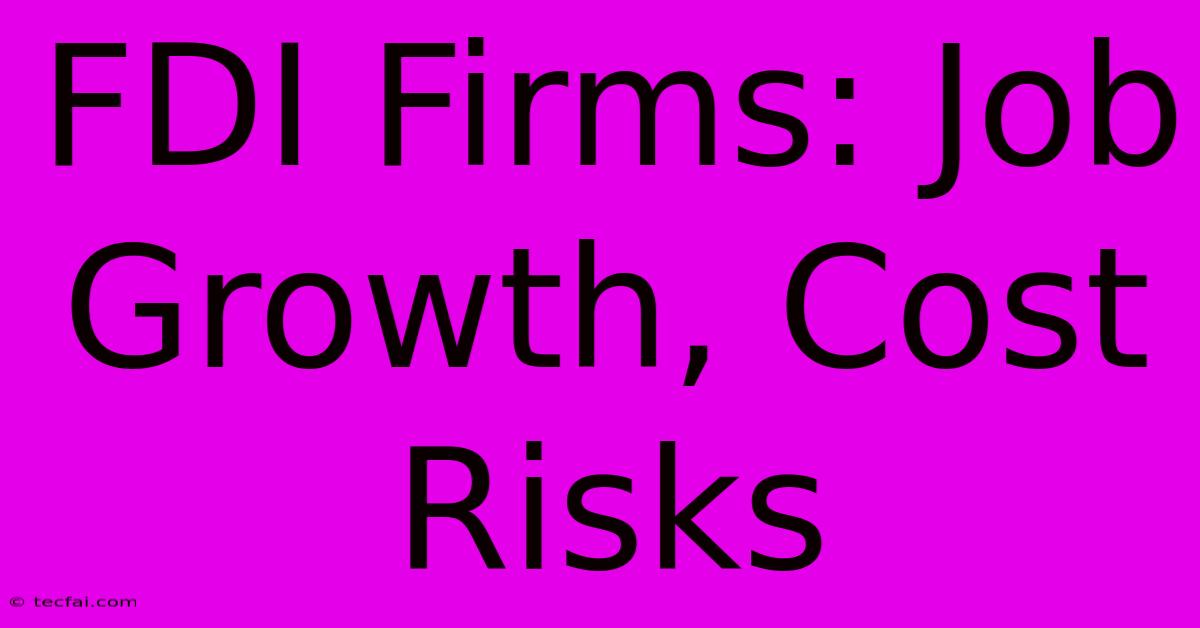FDI Firms: Job Growth, Cost Risks

Discover more detailed and exciting information on our website. Click the link below to start your adventure: Visit Best Website tecfai.com. Don't miss out!
Table of Contents
FDI Firms: Job Growth, Cost Risks – A Balancing Act
Foreign Direct Investment (FDI) firms play a significant role in the global economy, driving job creation and economic growth in host countries. However, this influx of investment also presents challenges, particularly concerning cost risks and the overall impact on the local job market. Understanding this complex relationship between FDI, job growth, and cost risks is crucial for policymakers and businesses alike.
The Promise of Job Creation: A Closer Look
FDI is often touted as a significant engine for job growth. Multinational corporations (MNCs) investing in a new country typically create jobs across various levels, from skilled managerial positions to semi-skilled and unskilled labor. This injection of capital often stimulates further economic activity, leading to a ripple effect of job creation within related industries and the broader economy.
-
Direct Employment: This is the most straightforward form of job creation, representing positions directly filled by the FDI firm itself. These positions can range from factory workers to high-level executives.
-
Indirect Employment: This refers to jobs created in supporting industries. For instance, a new car manufacturing plant might stimulate growth in local logistics, parts supply, and service businesses, generating further employment opportunities.
-
Induced Employment: This indirect effect encompasses jobs created due to increased consumer spending by employees of the FDI firm and those working in related industries. Increased demand leads to further economic activity and job generation.
The Cost Risks Associated with FDI: Navigating the Challenges
While the potential for job creation is substantial, FDI firms also bring inherent cost risks. These risks can impact both the FDI firm itself and the host country.
For FDI Firms:
-
Political and Regulatory Risks: Changes in government policy, unpredictable regulations, and political instability can significantly affect the profitability and sustainability of FDI projects. This includes risks related to expropriation, contract breaches, and changes in tax laws.
-
Economic Risks: Fluctuations in exchange rates, inflation, and macroeconomic instability can impact the cost of operations and profitability.
-
Operational Risks: These encompass challenges related to logistics, infrastructure limitations, labor relations, and security concerns.
-
Reputational Risks: Negative publicity stemming from labor practices, environmental concerns, or corruption allegations can damage a firm's reputation and affect its investment prospects.
For Host Countries:
-
Environmental Degradation: Unsustainable practices by FDI firms can lead to environmental damage, impacting the health and well-being of the local population and potentially incurring significant cleanup costs.
-
Exploitation of Labor: Concerns often arise regarding fair wages, working conditions, and labor rights within FDI firms, particularly in countries with weak labor regulations.
-
Dependence on Foreign Capital: Over-reliance on FDI can make a country's economy vulnerable to global economic fluctuations and potentially lead to a loss of control over key industries.
-
Increased Income Inequality: The benefits of FDI might not be evenly distributed, potentially exacerbating income inequality if the majority of job creation is concentrated in high-skilled sectors.
Balancing the Equation: Strategies for Success
To maximize the benefits of FDI while mitigating its risks, both FDI firms and host governments need to implement strategic measures.
For FDI Firms:
-
Thorough Due Diligence: Conducting comprehensive research into the political, economic, and social landscape of the host country is critical before making an investment decision.
-
Robust Risk Management Strategies: Developing strategies to mitigate potential risks, including insurance, hedging, and contingency planning, is essential.
-
Corporate Social Responsibility (CSR): Adopting responsible business practices that prioritize environmental sustainability, fair labor standards, and community engagement can build a positive reputation and foster stronger relationships with stakeholders.
For Host Countries:
-
Attractive Investment Climate: Implementing policies that encourage FDI while protecting the interests of the local population is crucial. This includes providing clear and stable regulations, developing robust infrastructure, and ensuring a skilled workforce.
-
Strengthening Labor Laws and Environmental Regulations: Enforcing strong labor laws and environmental regulations can prevent exploitation and ensure sustainability.
-
Investment Screening Mechanisms: Careful screening of FDI proposals to assess their potential impact on the economy and society can help to avoid investments that may be detrimental.
In conclusion, the relationship between FDI firms, job growth, and cost risks is a complex one requiring careful consideration. By understanding the potential benefits and drawbacks, and by implementing appropriate strategies, both FDI firms and host countries can work together to harness the opportunities presented by FDI while mitigating its inherent risks, ultimately leading to sustainable economic growth and development.

Thank you for visiting our website wich cover about FDI Firms: Job Growth, Cost Risks. We hope the information provided has been useful to you. Feel free to contact us if you have any questions or need further assistance. See you next time and dont miss to bookmark.
Featured Posts
-
Lions Bears Score Live Thanksgiving Game
Nov 29, 2024
-
Ariana Madix Post Vpr Parade
Nov 29, 2024
-
Special Nfl Thanksgiving Day Patches
Nov 29, 2024
-
Rod Stewart Accuses Wallace Of Bullying
Nov 29, 2024
-
Live Nfl Thanksgiving Game Scores
Nov 29, 2024
